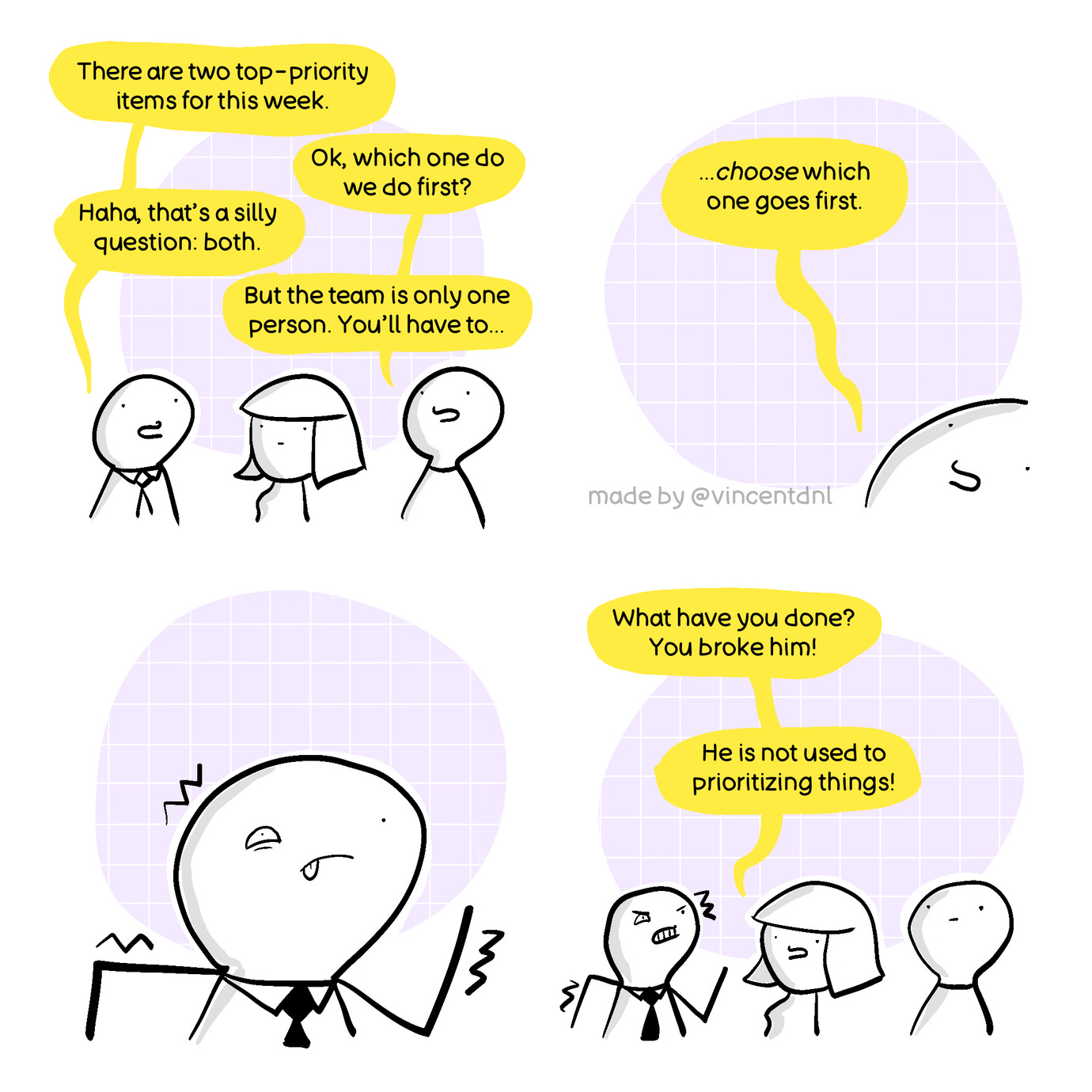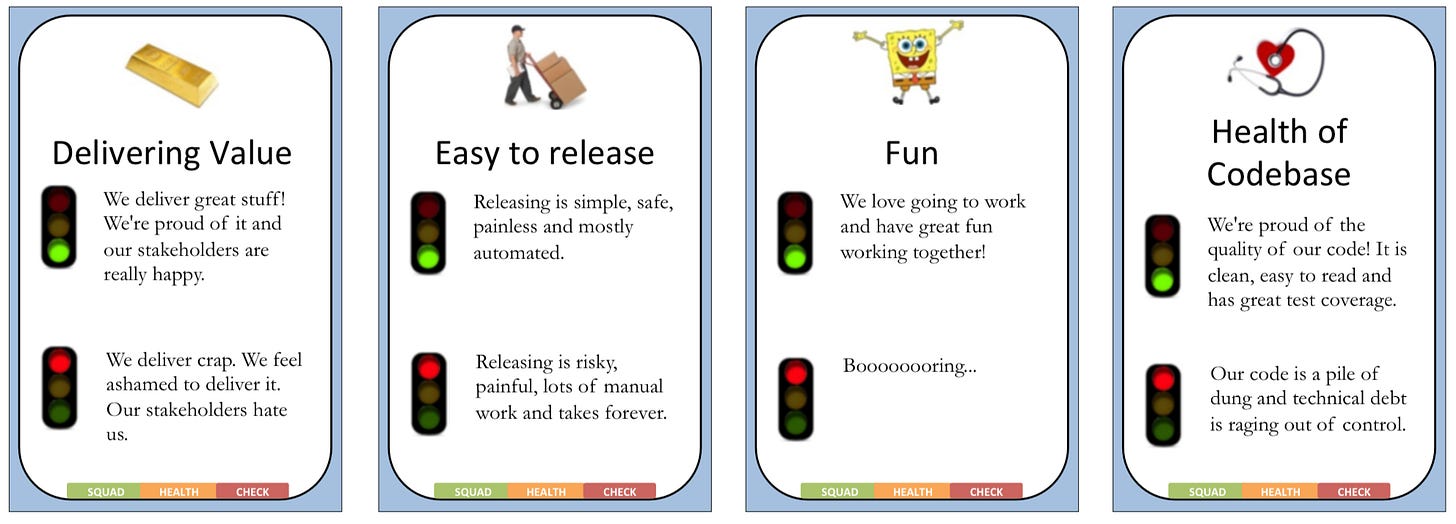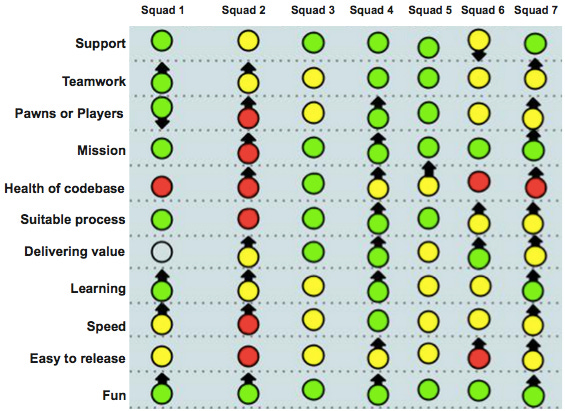The Fortnightly. 21.03.23
Highlights: A mental model on having meaningful discussions. How Spotify uses Squad Health-Checks as a model for continuous improvement. One of the best introductory talks on functional programming.
Hope you’re having a great week so far.
This is a fortnightly newsletter in which I share interesting articles, talks, quotes from literature, comic strips 😊 and many such things that I stumbled upon.
My favourite comic of the fortnight:
People cannot have a fruitful discussion on topics that are part of their identity. — Paul Graham
Paul writes that religion and politics eventually become part of the identity of people. In such cases the discussion ceases to be about the topic at hand and instead becomes about people’s identities themselves. At this point of time, the discussion ceases to be meaningful for either of the participants.
“As a rule, any mention of religion on an online forum degenerates into a religious argument. Why? Why does this happen with religion and not with Javascript or baking or other topics people talk about on forums?
What's different about religion is that people don't feel they need to have any particular expertise to have opinions about it. All they need is strongly held beliefs, and anyone can have those. No thread about Javascript will grow as fast as one about religion, because people feel they have to be over some threshold of expertise to post comments about that. But on religion everyone's an expert.
Then it struck me: this is the problem with politics too.
[…]
I think what religion and politics have in common is that they become part of people's identity, and people can never have a fruitful argument about something that's part of their identity. By definition they're partisan.”
Each and every one of us has witnessed or (and) been part of an opinionated discussion which doesn’t seem to head towards any outcome. The more strongly we hold our opinions, the more they embed themselves in our identities. An attack on our opinion seems like an attack on ourselves.
The key to have a meaningful discussion, then, is to keep your identity small.
The most intriguing thing about this theory, if it's right, is that it explains not merely which kinds of discussions to avoid, but how to have better ideas. If people can't think clearly about anything that has become part of their identity, then all other things being equal, the best plan is to let as few things into your identity as possible.
Spotify’s Squad Health Check Model
Spotify uses a qualitative and human-centric approach towards improvement and gaining insights into “how are their teams doing?”.
Key Insights:
Qualitative data on a squad’s health is gathered through face to face discussions; and online-surveys are avoided. The discussions help in gaining meaningful insights and context, which often get missed in online surveys.
Such a model works only when there is high-trust, curiosity and psychological safety within the environment.
The data is collected through a lean model with the help of their health-indicators cards called “Awesome Cards”. The cards contain an example of “what good looks like” and an example of “what crappy looks like”. Each card stands for an aspect of work that the team is interested in learning more about, for e.g. “Ease of release”, “Health of codebase”, “Delivering Value” etc.
Results, when put collectively for all squads gives an easy reflection on how the company as a whole is doing.
“It shows how 7 different squads in a tribe see their own situation. Color is current state (green = good, yellow = some problems, red = really bad). Arrow is the trend (is this generally improving or getting worse?).
Stare at it for a minute, and you start seeing some interesting things:
Scan each column, and you see some major differences between squads. Squad 4 is happy with just about everything. Squad 2 is having lots of trouble, but most things are improving.
Scan each row, and you see systemic patterns. Every squad is having fun (and it’s even improving)! Motivation is apparently not a problem at all. But the release process is problematic, and the codebase is overall in bad shape. Over time, that will probably reduce the Fun as well.
Scan the overall picture, and you see that just about every arrow is up, only two down arrow in the whole picture. That means the improvement process (the most important process of all) seems to be working.”
— Spotify
Each team itself is responsible and encouraged to modify the model, supporting collective autonomy within squads and how they choose to learn about their work.
Health-checks are designed to have no incentives, in order to prevent them from getting gamed.
Follow ups with teams to gauge the usefulness of the model for them and feed back the insights towards improving the model, thus fostering a virtuous cycle.
Watch Spotify’s latest talk on Squad Health Checks:
Functional Design Patterns by Scott Wlaschin
This is one of the best talks out there which introduces functional programming paradigms and patterns without getting into [too much] theoretical concepts about Category Theory.
A highly recommended watch for folks trying to learn FP patterns. Equally recommended as a leisure watch for seasoned FP and Category Theory enthusiasts — you’ll appreciate the simplicity of Scott’s explanations.
Do explore his website for more interesting articles and talks.
Thank you for reading. This is a public and free newsletter, do share it with your friends if you liked it. If you have something you’d like to share, do write to us at newsletter@partnest.io.




